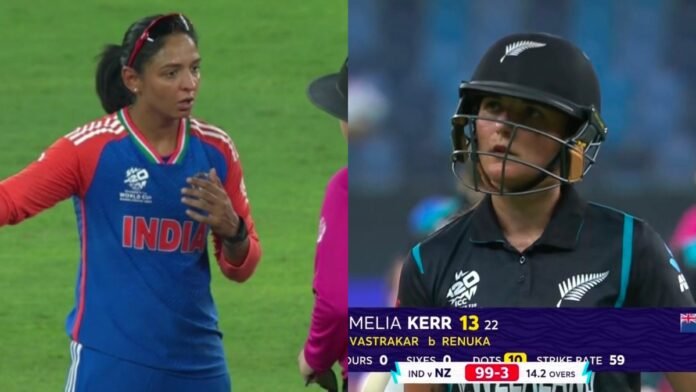harmanpreet kaur and amelia kerr
Indian Women Cricket Team: The Indian team had a very bad start in the Women’s T20 World Cup 2024. In the very first match, India had to face defeat against New Zealand by 58 runs. India’s bowlers and batsmen flopped badly in this match. New Zealand women’s team batted first and scored 160 runs. After this, the Indian team could not even play the full 20 overs while chasing the target and was reduced to 102 runs. An incident happened in this match, which is being discussed everywhere.
Amelia Kerr was called to bat after being run out
Deepti Sharma bowled the 14th over for the Indian team. New Zealand’s Amelia Kerr was run out while trying to score a run on the last ball of this over, but the umpire did not give her out. Actually, on the last ball of the 14th over, Amelia played a shot at long-off and came on non-strike with 1 run. After this the umpire gave her cap to the bowler Deepti Sharma. But the ball was in the hands of Indian captain Harmanpreet Kaur and she did not throw it towards the bowler. Due to this, New Zealand players Sophie Devine and Amelia Kerr ran to score runs. When Harmanpreet saw the New Zealand players running, she threw the ball towards wicketkeeper Richa Ghosh and Richa ran out Amelia Kerr without making any mistake. Amelia considered herself run out and started returning towards the pavilion, but the third umpire called her back.
After this the umpire said that she had already signaled the completion of the over. For this reason it was considered a dead ball and Amelia Kerr was not out after being run out. There was a long debate regarding this between the umpire and Indian captain Hamanpreet Kaur. But the result was not in favor of India.
Dead ball rules as per MCC 20.1:
- This rule is very important, it states whether the ball is dead or not. Only the umpire will take the final decision.
- The ball will be considered dead when it becomes clear to the umpire that both the fielding team and the teams at the wicket have agreed that the ball is dead.
- Unless the umpire says ‘over’ or ‘time’ after every over. Till then the ball will not be dead. It is up to the umpire whether he says ‘over’ or ‘time’ after the end of the over.
- When the ball becomes dead, the umpire standing at the bowler’s end may signal a ‘dead ball’. If he feels that it is necessary to give this information to the players, then he can tell them about it.
Also read:
South African team did a great job, broke Pakistan’s 17 year old record
2 teams announced for ODI and T20 series, players of Delhi Capitals and Rajasthan Royals become captains




